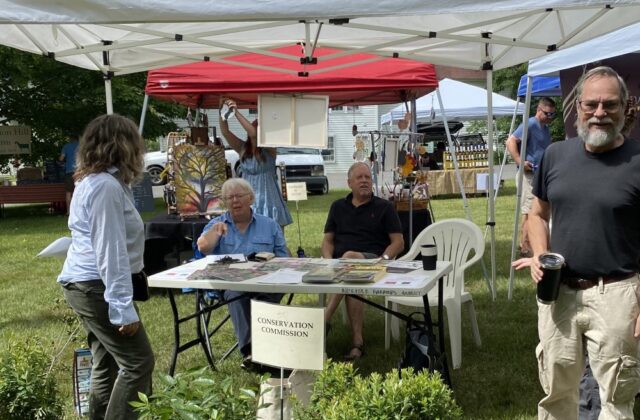Conservation Commission Serves to Protect Norfolk’s Natural Resources
Town Boards, Commissions, & Committees
by Ruth Melville
Every town in Connecticut is empowered by the state to have a conservation commission, whose duties are to care “for the development, conservation, supervision and regulation of natural resources, including water resources.” To fulfill this mission, the Norfolk Conservation Commission (NCC) is active on several fronts, from combatting the spread of invasive species to reducing the amount of salt in our streams and wetlands to educating residents about ways to live more ecologically.
Like other state-mandated conservation commissions, the NCC serves in an advisory capacity and has no regulatory power. Members are appointed and sworn in by the Board of Selectmen. The five current members of the Norfolk Conservation Commission are Martha Klein (chair), John Anderson, Libby Borden, Shelley Harms, and Nash Pradhan, with alternates Mattie Vandiver and Susannah Wood.
One major undertaking of the NCC is to slow the spread of invasive species. Animals and birds—as well as wind and water—carry seeds from these plants into the woods, where they crowd out the native plants that are crucial to support local pollinators and birds. Some of the worst offenders in this area are winged euonymous (burning bush), Japanese honeysuckle, garlic mustard, multiflora rose, buckthorn and Japanese barberry (which, even worse, has been linked to the increase in ticks carrying Lyme disease).
Over the years the NCC has encouraged major property holders around town—including the Town Hall, National Iron Bank, Infinity Hall, the Church of Christ Congregational and the Battell Stoeckel Estate—to replace invasive ornamental shrubs on their properties with native ones; led a walking tour of downtown and City Meadow, identifying invasive plants along the way; and put together a team to remove burning bush and Norway maples from around Buttermilk Falls. The NCC also holds an annual plant exchange at the farmers market. Every resident who brings in an invasive ornamental receives a free native one in exchange.
Salt leaching into local waterways is another issue of major concern to the NCC. The NCC has been working with Town Hall to cut back on the amount of salt put on our roads in the winter. Since 2019, Susannah Wood, recently with the help of Mattie Vandiver, has been spot testing streams and wetlands around town, looking for places with higher salt concentrations.
One “hot spot” they found last was near the intersection of Winchester and Grantville Roads, where their samples showed a higher concentration of salt on one side of Kelly swamp. It turned out it was coming from a hole in the road, which just needed to be repaired. Another problem area is near a mound of salty sand on North Colebrook Road, a place where salt trucks turn around and drop some of their load. The NCC has asked the town to clear that pile away, and it is slated to be removed during this summer’s repairs.
Starting this spring, the NCC has been sponsoring a series of monthly webinars on topics like backyard composting, humane beaver management and, in collaboration the Church of Christ Green Group, the Norfolk Foundation, and the library, living a plastic-free life. The next one, on “Pollinator Pathways,” will be at the Hub on Aug. 16, at 5 p.m.
The NCC is also looking for ways to reduce the town’s solid waste. Trash burning is expensive, and once the MIRA (Materials Innovation and Recycling Authority) plant in Hartford closes next year, Connecticut’s garbage will have to be trucked to landfills in neighboring states. To reduce the amount of food waste, NCC has applied for a grant from the state Department of Energy and Environmental Protection (DEEP) to get home-sized composting containers, made out of recycled plastic, to distribute to Norfolk residents.
A final responsibility of the NCC is to update the town’s Natural Resources Inventory, which was last done in 2009. This is a big job, covering the town’s geology, wildlife, plant life, watersheds, climate, and more. Right now they’re in the midst of editing the new iteration, which will be out before the end of the year.
Meetings of the Norfolk Conservation Commission are public and held monthly, on the third Wednesday of month, 6 to 7 p.m. Minutes of the meetings are published and available on the town website. The commission is actively looking for new members and can be contacted at conservationcommission@norfolkct.org.

